Maximize Your Resources
By Randell Tiongson on September 18th, 2015
How do you maximize resources? I am now featuring the post of The Cristobal, the powerful financial advocate couple Tristan and Carmi Cristobal. A truly helpful post for everyone….
——–
When I was single and while in college, I never had an interest of working abroad. I was confident that I’ll be able to sustain my life once I got my degree and passed the board exam. Now, I’m married with one kid – I am working abroad. I realized that I was so young, back then, and wrong to think that I don’t need to go abroad but here I am working abroad while my family is in the Philippines
I am not here abroad without any reasons. I am just one of the OFWs who decided to leave the country with many reasons on hand. Here are our few reasons, as OFWs:
- To earn more to be able to support our family
- To pay off debts
- To be able to save for the future
- To achieve certain goal like establish a business, buy a house and lot, etc..
There are too many reasons to list and for sure, it will be unlimited but one thing that we have in common – To eventually come back home to our family or Philippines with enough savings. To achieve this, we – OFWs have to work hard for it.
The sad reality…
According to the survey of Philippine Statistic Authority, only 2 in every 5 OFWs were able to save from their cash remittances from April to September 2014 – A sad reality that 60% of OFWs don’t have savings. This gives us no doubt, why there are OFWs working abroad for 20 years or so. OFWs spent most of their lives abroad than with their family in the Philippines.
Reality Check…
There are too many factors to consider because life is not just about money. Life is also about having a life, good relationships, strong faith, and other things. Yes, we work abroad for money but in fact, nobody can really tell if one is successful or not. Why? An OFW can be financially successful but he/she might not be successful in relationship with his/her daughter, sons, siblings, etc. An OFW might be successful now but after 10 years no one can really tell.
A reality that an OFW should consider and know how to protect all the sacrifices not only for money but also the relationship, faith, etc…
The point is…
Let’s not waste our sacrifices while working abroad. An OFW should know that everything that you do in your personal life has a financial impact in your life, maybe not now but on the later stage of life.
Being an OFW is an opportunity that we should maximize. We should maximize the resources that we have – Time, Talent, and Treasure according to our goals.
How to maximize our resources?
On a personal note..
Firstly, we – OFWs should have reasonable financial plan from the time we become overseas worker up to retirement period. This includes increasing your skills, income, and values.
Secondly, an OFW should have an escape plan as well for being an OFW because we will not be OFWs for life.
Thirdly, start your financial plan from the famous saving formula which is: Income – Savings/Investments = Expenses.
Lastly, if you feel like your finances are not improving, don’t be depressed but rather focus on something that you know can help you achieve your financial goal.
We can use our time and treasure while abroad by investing…
We can say that all kinds of investment, as long they are legitimate, are best for OFWs to invest in. The reason is that investments have the potential to grow one’s money and help one achieve its financial goal. OFWs can invest on the following:
- Business Investment,
- Stock Investments,
- Mutual Funds/UITFs,
- Cash Equivalents (Time Deposits),
- Protection (Variable Unit-Linked),
- Bonds
- Other legit investments
In addition to this, try not to commit the common money mistakes of OFWs while working abroad such as overspending, availing bank loans without proper payment plans, buying during sales without budget, etc…
And yes, it’s a reality that not everyone can be rich but everyone can be wealthy and deserve financial security. Nobody will give you financial security but only you.
Regards,
The Cristobal
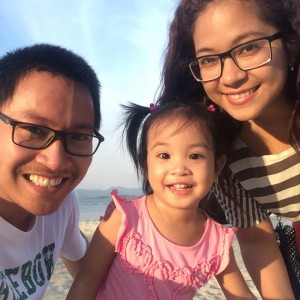 Tristan is an OFW while Carmi is based in Philippines.
Tristan is an OFW while Carmi is based in Philippines.
The couple is an accountant by profession. Tristan works as a Senior Compliance Officer in Jeddah while Carmi is an Accounting Manager in Philippines.
On the side, the couple is both active volunteers of Angat Pilipinas Coalition for Financial Literacy Inc. – a global non-profit organization of personal finance advocates. Carmi is the current President of the organization while Tristan is the Mission Director in Western Region of KSA.
Tristan is also a volunteer in PICPA – Western Region of KSA as VP for Professional Development and Board Exam Reviewer while Carmi is a Certified Investment Solicitor and currently pursuing her RFP.
- Please visit www.thecristobal.info for more information about life, relationship, business, investments, and personal finances. The website is a family oriented site. The founders’ story is a typical story of one Filipino who decided that one should go abroad while the other partner should stay in Philippines.
The founders authored two e-books entitled:
- How to understand OFWs and help them go back home – which is being given for free. One just need to sign-up to grab the copy
- Discover the five year Plan of an OFW – One of the objectives of the couple is to share their secret formula for every OFWs on how to go back in Philippines and to answer the question “Hanggang kailan ka magiging OFW?”.
Special finance events for Dubai & Abu Dhabi OFWs!
By Randell Tiongson on August 18th, 2015
I will be back in the UAE for a series of training for the OFWs this September! It’s time to level up learning and be on your way to financial peace!
1) Economics 101 & Investment Outlook (Dubai) — this program will discuss the rudiments of economics especially matters that will have an effect to investors. How does interest affect investments? How does inflation play a factor in growing your wealth? How does monetary policies used to spur the economy?The program will touch up on basic macroeconomic learning as well as a thorough look on the Philippine economy as a bonus feature of the event. It is high time that we all understand economics and how it affects our everyday lives!
To register, click HERE or email dubaifinancialevents@gmail.com
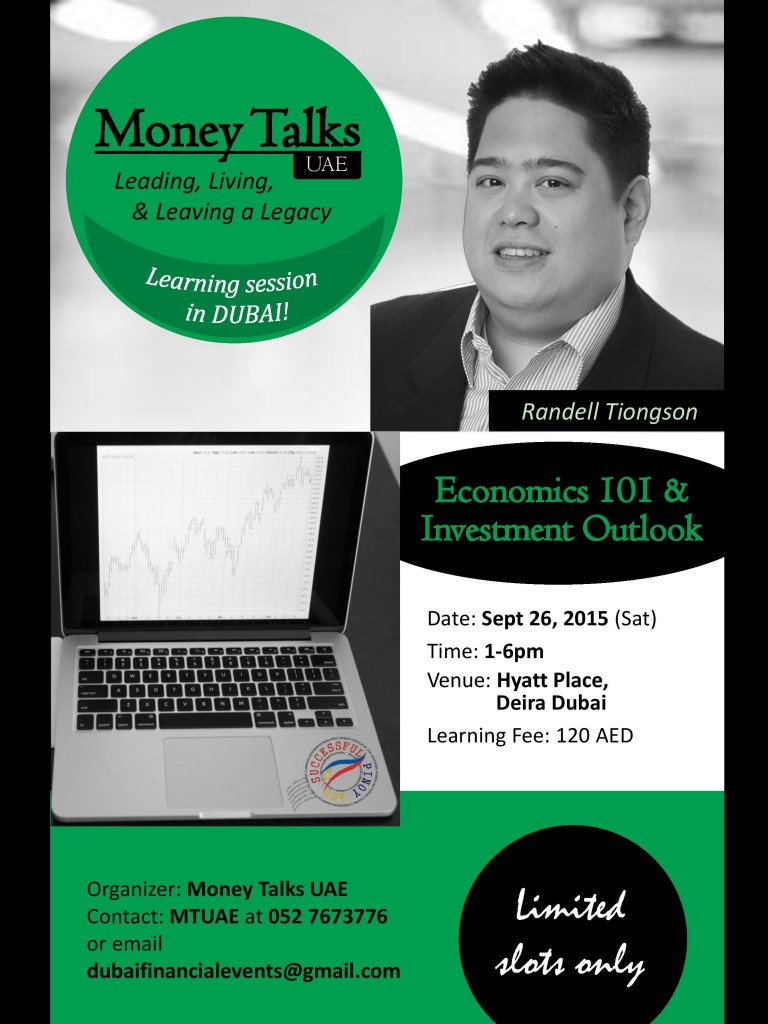
2) Retirement & Estate Planning (Abu Dhabi)
Studies shows that only 1 to 2 out of 10 Filipinos prepare for retirement. Studies also reveals that the few who prepare for retirement, most of them will only exhaust their retirement funds halfway through retirement. Filipinos are experiencing longer life expectancy but unfortunately, huge costs are needed to live a life of comfort during those years.
Consider this: If you can generate 75% of your pre-retirement income during your retirement years, you will live a life of comfort; if you can only generate 30-50%, you will live a life of struggle. For a 20 year retirement, you need at least 20 years of preparation — if you plan to retire at 60, then you should start preparing at 40.
As and added feature, I will also discuss basics of estate planning under the Philippine setting. Many Filipinos are unaware of why estate planning is important to them.
To register, click HERE or email dubaifinancialevents@gmail.com
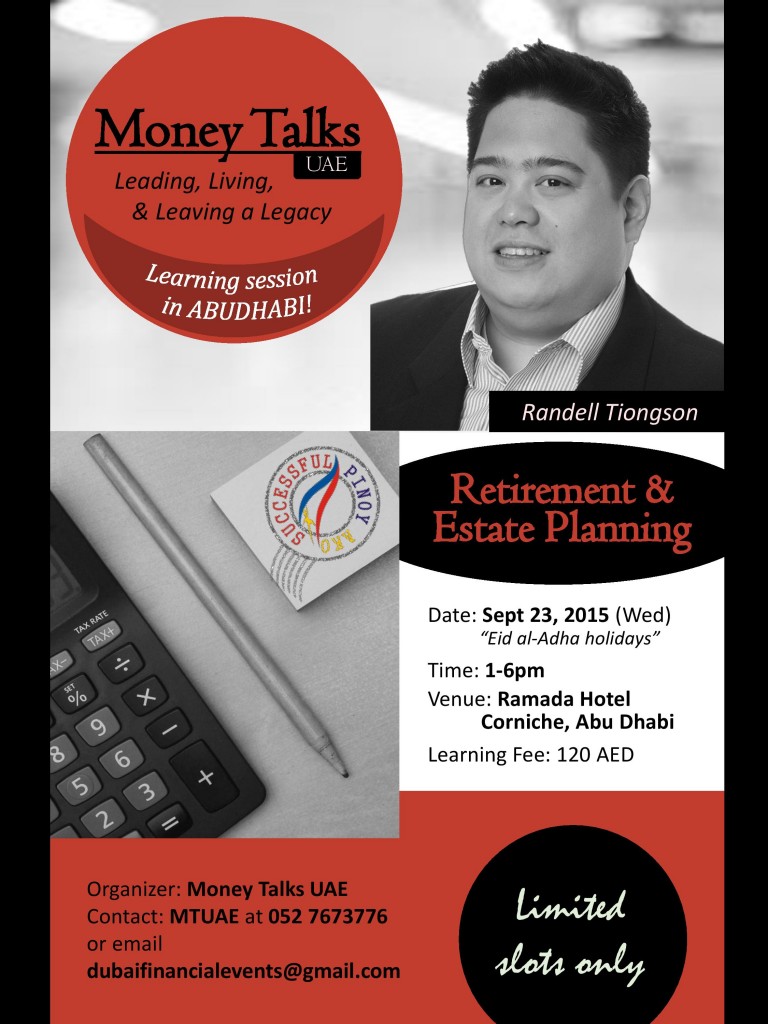
HURRY! We are only limiting this offerings through limited slots only.
5 Simple Ways for OFWs to Invest in the Philippines
By Randell Tiongson on May 13th, 2015
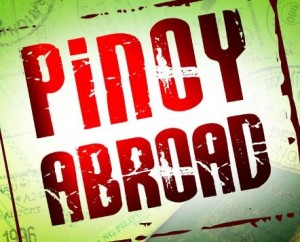 OFWs are generally the kind of people who leave home because they want to provide for their respective families, others still are looking to broaden their life experiences by working abroad for a time. With their time working abroad comes the idea of eventually putting the money they’ve worked hard for to good use.
OFWs are generally the kind of people who leave home because they want to provide for their respective families, others still are looking to broaden their life experiences by working abroad for a time. With their time working abroad comes the idea of eventually putting the money they’ve worked hard for to good use.
Most will find themselves putting that money towards small businesses that their families can run in their stead; others will start a savings account and allow the money they deposit to incur interest. There are other ways to grow one’s hard-earned money, such as investing.
Many people find the idea of investing somewhat daunting – the most common reaction is usually “don’t you have to study the stock market to get anything done?” There is a certain amount of study that comes with investing, but there are a number of accessible investment platforms available to the average OFW, and are usually tailored to one’s Risk Profile.
A Risk Profile basically determines how aggressive someone is when it comes to making an investment, or one’s Risk Appetite. The first thing anyone wanting to start an investment portfolio is to take a client suitability assessment questionnaire, which will allow you to see exactly what kind of investment vehicle best applies.
Of course, the kind of investment vehicle you choose depends on the amount of money you choose to risk, hence the need for one to take the assessment.
There are several ways to start your investment portfolio, and here’s five:
Mutual Funds
By far, investing in a Mutual Fund appears to be the simplest of the options when it comes to investment vehicles. This type of investment takes most of the work out of your hands and places it in the very capable ones of fund managers. Their job will be to grow the money you invested, without you having to monitor it constantly.
Here’s a list of mutual fund investments that you can access online:
Stock Investments
Arguably, investing in publicly traded stocks requires a certain kind of aggression in terms of your risk appetite, and some research. Buying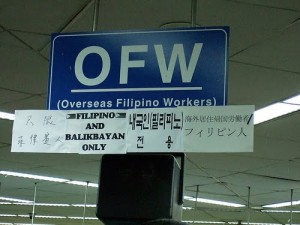 stocks basically means becoming a shareholder in a publicly traded company. Being a shareholder means you own a part of the company, but only so far as much stock that you own in said company. The bigger your stock, the more you can participate, and the more you earn depending on the company’s performance.
stocks basically means becoming a shareholder in a publicly traded company. Being a shareholder means you own a part of the company, but only so far as much stock that you own in said company. The bigger your stock, the more you can participate, and the more you earn depending on the company’s performance.
Getting started requires opening an account with a broker, and here’s a list of online stock brokers accredited by the Philippine Stock Exchange:
Unit Investment Trust Fund (UITF)
This form of investment involves holding a certain amount of money in trust as part of the investment made. It shares a similar structure to mutual funds in the aspect that your money will be managed by fund managers. This is usually offered by banks, and differs from mutual funds because they revolve per unit investment, as opposed to the shares in a mutual fund.
Here’s a partial list of banks that offer UITFs:
- Metrobank
- BDO
- Union Bank
- BPI
- PNB
- Chinabank
- Security Bank
- EastWest Bank
Bonds
Given the propensity of OFWs to save their money in bank accounts, an investment vehicle that may also be available to them comes in the form of Bonds. This form of investment is generally offered by large corporations and government offices (Retail Treasury Bonds) as a means of raising funds or essentially borrowing from the public. They have a fixed maturity date.
Here’s a few banks that also act as gateways to purchasing Bonds
- PNB
- BDO Unibank
- BPI
- Metrobank
Real Estate
This type of investment isn’t necessarily unusual, but leans more towards preparing for a future home, or somewhere to put up a business. This form of investment requires a higher amount of money to start with as opposed to say, mutual funds. The money invested into real estate generally means having enough to make the payments to the land that you have purchased, and the lower the interest rate, the better.
What may eventually earn money from investing in real estate is the way land use changes over the years. One can acquire property through the Register of Deeds, but make sure to check the land title for encumbrances (mortgage, debts, and the like).
These are just some of the ways that OFWs can invest in the Philippines. It mostly takes a certain amount of patience and research before you pick your investment gateway.
 Tristan is an OFW while Carmi is based in Philippines.
Tristan is an OFW while Carmi is based in Philippines.




